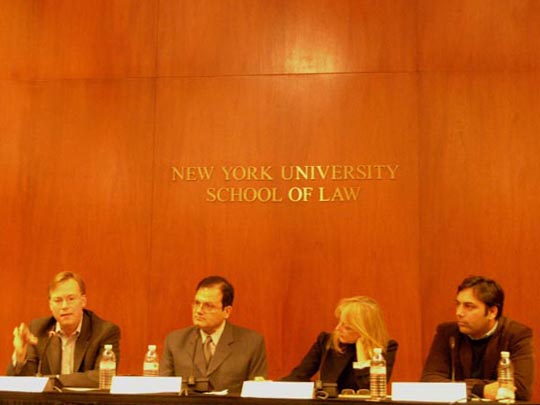New York-The New York University’s Center On Law and Security held a discussion on the role of the Kashmir conflict in the context of the South Asian security environment and the disputed region’s place in overall Indo-Pakistani relations. The speakers included Steve Coll of the New Yorker magazine and author of Ghost Wars, Pakistani journalist Arif Jamal and author of Shadow War:The Untold Story of Jihad in Kashmir, and Basharat Peer, Kashmiri journalist and author of Curfewed Night.

From Left: Steve Coll, Arif Jamal, Karen Greenebrg and Basharat Peer
Basharat Peer began the discussion with a general background on the history of the Kashmir dispute and its relevance within the post-partition ideologies in the Indian subcontinent. Peer told the audience of Nehru, himself a Hindu Pandit from the Kashmir Valley, and his belief that maintaining control over a Muslim majority state was an essential element of the inward projection of Indian secularism. Obversely, Pakistan, being founded on the principle of an Islamic Republic, necessitated the Muslim Kashmir be absorbed into Muslim Pakistan.
Arif Jamal related an anecdote of an American diplomat, who upon meeting with a Pakistani counterpart, asked to begin the discussion on Kashmir’s hot and cold cycle of crisis. When the Pakistani official curiously asked why, the American responded “When I come to discuss the Taleban, people in your government shoot back with “Let’s start with discussing Kashmir””. The American learned that he should cut to the chase and realized from the Pakistani perspective that the war over the Valley was of primary importance while the American war with the Taleban and Pakistan’s proxies in Afghanistan was secondary. Jamal explained that jihadi ideology, rather than being some recent off shoot of globalization, was in fact an integral focus of the Pakistani defense establishment’s outlook since the nation’s inception. Jamal differentiated between being an Islamist and a so-called Jihadist. “One does not have to be an Islamist to be a Jihadist”. In that sense, Ronald Reagan was a jihadist to the extent that he espoused the framing of the Soviet-Afghan war as a Holy War pitting pious Afghans against godless Soviet Communism.
Steve Coll mentioned excerpts from his recent New Yorker piece The Back Channel on Indo-Pak negotiations and recent events roiling the subcontinent. Coll described the lack of a regular Western media presence in Srinagar as possible reasoning behind the Mumbai atrocities. As Coll put it, “A suicide bomber entering a police barracks in Srinagar won’t make the evening news in the United States but attacking five star hotels in Mumbai will”. Coll commented when asked by moderator Karen Greenberg whether he agreed with David Kilcullen’s assessment that Pakistan may collapse in six months time due a marked decrease in the country’s overall security profile by saying that Kilcullen had overstated his case and that Pakistan’s relatively successful (and peaceful) elections showed that the overwhelming majority of ordinary Pakistanis do not want to live in a feudal Sharia state. (Author’s Note:The best example of this is the voters of NWFP throwing out the militant leaning Muttahida Majlis-e-Amal in favor of the secular Pashtun nationalist Awami National Party)
An interesting part of the discussion was the disagreement between Jamal and Coll over the proposed styles of a Kashmir settlement. Arif Jamal advocated the sanctioned internationalization of Kashmir talks because the historical record of three wars and over sixty years of squabbling between India and Pakistan demonstrates that they are not capable of coming to a mutually trustful agreement without pressure from some international body. Steve Coll sharply disagreed stating the Kashmir conflict must be solved bilaterally inherent to the 1972 Simla Agreement and said that a far more likely scenario would involve non-declared internationals quietly partaking in outward bilateral talks.